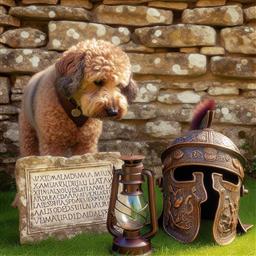3rd Century Dog Names - Page 2
Updated: June 18, 2024
Delve into the rich tapestry of history and discover the fascinating world of canine monikers that were prevalent in the intriguing era of the 3rd Century. Our curated list provides a unique insight into the culture, traditions, and values of that time, reflecting the significant roles dogs played in the lives of our ancestors.
This collection of names is not just a simple list, but a journey back in time to an era when dogs were not only pets but also held important roles as hunting partners, protectors, and even spiritual guides. These names, steeped in history and cultural significance, provide an intriguing perspective on the relationship between humans and dogs during this period.
Whether you're a history enthusiast, a dog lover, or simply someone looking for a unique, meaningful name for your pet, this collection offers something for everyone. Embark on this historical adventure and allow these age-old names to inspire and enchant you.
| Name | Reason to Choose |
|---|---|
| Demeter | After the Greek goddess of agriculture |
| Diana | Named for the Roman goddess of the hunt, the moon, and nature |
| Diocletian | A tribute to Diocletian, a Roman Emperor known for his administrative and military reforms |
| Domitian | This name of a Roman Emperor would be fitting for a regal dog |
| Drusus | A name from an influential Roman family during the 3rd century |
| Eros | Named for the Greek god of love |
| Fabius | A name from a distinguished Roman family |
| Faustina | Named after the wife of Roman Emperor Antoninus Pius, a popular name for female dogs in the era |
| Felix | This name, meaning 'lucky', would have been popular for dog owners seeking fortune |
| Flavius | A common Roman name during the 3rd century |
| Gaius | It's a common Roman name that would have been used during this time period |
| Galba | One of the 'Year of the Four Emperors', fitting for a 3rd century dog |
| Galerius | Named after Galerius, a Roman Emperor known for his persecution of Christians |
| Gallienus | Gallienus was a Roman Emperor known for his military reforms |
| Gallus | Derived from a Roman family name, it reflects the era's social dynamics |
| Geta | It harks back to Publius Septimius Geta, a Roman Emperor of the 3rd century |
| Glycerius | Glycerius was a Roman Emperor known for his brief rule in the Western Roman Empire |
| Gnaeus | A common Roman praenomen, fitting for a 3rd century dog |
| Gordian | Named in honor of Gordian III, a Roman Emperor who reigned during the 3rd century |
| Gratian | Gratian was a Roman Emperor known for his religious policies favoring Christianity |
| Hades | After the Greek god of the underworld |
| Hadrian | Named after Hadrian, a Roman Emperor known for his significant building projects |
| Hector | A Trojan prince and the greatest fighter for Troy in the Trojan War |
| Helen | Named for the most beautiful woman in the world according to Greek mythology |
| Hera | The queen of the Greek gods |
| Hercules | Named for the Greek hero and god |
| Hermes | After the Greek god of trade, heraldry, merchants, commerce, roads, thieves, and sports |
| Homer | Named for the legendary author of the Iliad and the Odyssey |
| Honorius | Honorius was a Roman Emperor known for his rule during the decline of the Western Roman Empire |
| Horatius | A hero from Roman legend, it would have been a popular name |
|
Suggest:
|
Submitted!
|
| 1 2 3 4 5 | |
Famous Battles
| Name | Description |
|---|---|
| Antioch | A tribute to the Battle of Antioch, an important event in the 3rd century |
| Artaxata | This name is inspired by the Siege of Artaxata, an important event in the Roman-Persian wars |
| Aurelian | Named for the Emperor Aurelian, who brought the Roman Empire back from the brink of collapse |
| Carrhae | Named after the Battle of Carrhae, one of the key battles in the Roman-Persian wars |
| Claudius | A tribute to the Emperor Claudius Gothicus, who defended the Roman Empire against the Goths |
| Ctesiphon | Named after the Battle of Ctesiphon, a cornerstone event in the Roman-Persian wars |
| Cyriades | Named for the Roman usurper, who played a significant role in the 3rd century battles |
| Decius | A tribute to the Emperor Decius, who led the Romans in several 3rd century battles |
| Edessa | This name represents the Battle of Edessa, a devastating loss for the Romans |
| Galerius | Named after the Emperor Galerius, who led the Romans in several 3rd century battles |
| Gordian | Honors the Gordian Dynasty, which ruled during a tumultuous period in the 3rd century |
| Gothicus | Derived from the Gothic War, a significant 3rd century conflict |
| Issus | Named after the Battle of Issus, one of the most famous battles of the 3rd century |
| Mediolanum | Honors the Battle of Mediolanum, which marked a turning point for the Roman Empire |
| Nisibis | This name commemorates the Siege of Nisibis, a renowned 3rd century battle |
| Palmyra | This name represents the Palmyrene War, a significant event in the 3rd century |
| Postumus | A tribute to the Emperor Postumus, who established the Gallic Empire during the 3rd century |
| Sapor | Named after King Sapor of Persia, a formidable opponent in many 3rd century battles |
| Sarmizegetusa | This name commemorates the Siege of Sarmizegetusa, a significant event in the Roman-Dacian wars |
| Sassanid | This name signifies the Sassanid Empire, the opponent in many 3rd century battles |
| Singara | Named for the Battle of Singara, which occurred during the Roman-Persian wars |
| Tetricus | A tribute to the Emperor Tetricus I, a key player in the Crisis of the Third Century |
| Thracia | Represents the Battle of Thracia, a significant conflict in the Roman Empire during the 3rd century |
| Valerian | Honors the Emperor Valerian, who was captured in the Battle of Edessa |
| Zenobia | Honors the Queen Zenobia, who led her troops in the famous Palmyrene War |
|
Suggest:
|
Submitted!
|
Ancient Gods and Goddesses
| Name | Description |
|---|---|
| Apollo | Apollo was a god associated with music, poetry, and the sun in ancient Greek mythology |
| Ares | As the Greek god of war, Ares could be a fitting name for a protective guard dog |
| Artemis | Artemis, the Greek goddess of the hunt, is a strong name for a hunting dog |
| Athena | This goddess was worshipped for her wisdom and courage in Greek mythology |
| Bacchus | Referred to as the god of wine and festivities in Roman mythology |
| Cupid | Cupid, the Roman god of love, would be a cute name for a loveable puppy |
| Demeter | In Greek mythology, Demeter was worshipped as the goddess of harvest |
| Diana | In Roman mythology, Diana was the goddess of the hunt, making it a fitting name for an adventurous dog |
| Hades | Hades was the ruler of the underworld in Greek mythology, making it a striking name for a black dog |
| Hephaestus | The Greek god of fire and forge could be a strong name for a dog with a fiery spirit |
| Hera | Ancient Greeks revered Hera as the goddess of marriage and birth |
| Hermes | Named after the Greek god of travel, making it perfect for a dog that loves car rides |
| Hestia | The Greek goddess of the hearth and home, Hestia is a comforting name for a family pet |
| Juno | Juno, the Roman goddess of marriage, could be a comforting name for a family pet |
| Jupiter | Jupiter, the Roman king of the gods, may be a regal name for a proud dog |
| Mars | In Roman mythology, Mars was invoked as the god of war |
| Mercury | Mercury, the Roman god of commerce and travel, may be a unique name for an energetic dog |
| Minerva | Minerva, the Roman goddess of wisdom, could be an impressive name for an intelligent breed |
| Neptune | Neptune, the Roman god of the sea, may be an appropriate name for a dog that loves water |
| Persephone | Persephone, the queen of the underworld in Greek mythology, could be a unique name for a female dog |
| Pluto | Pluto, the Roman god of the underworld, could be a striking name for a black dog |
| Poseidon | Poseidon was the god of the sea, revered in ancient Greek mythology |
| Venus | Venus, the Roman goddess of love, could be a beautiful name for a lovable dog |
| Vulcan | Vulcan, the Roman god of fire, could be a powerful name for a spirited dog |
| Zeus | The king of the gods in Greek mythology, Zeus is a powerful name for a strong and noble dog |
|
Suggest:
|
Submitted!
|
Historical Locations
| Name | Description |
|---|---|
| Alexandria | One of the most important cities of the 3rd Century in Egypt |
| Antioch | In the 3rd Century, this was one of the largest cities in the Roman Empire |
| Athens | The heart of Ancient Greece, a powerful civilization and empire |
| Babylon | An ancient Akkadian-speaking state and cultural area based in central-southern Mesopotamia |
| Capua | City in Italy that was a key area in the Roman Empire |
| Carthage | Ancient city located on the eastern side of Lake Tunis, a significant city in the 3rd Century |
| Constantinople | The capital city of the Roman/Byzantine Empire |
| Crete | The largest and most populous of the Greek islands, the fifth-largest island in the Mediterranean Sea |
| Cyrene | An ancient Greek and later Roman city near present-day Shahhat, Libya |
| Damascus | One of the oldest continuously inhabited cities in the world was a significant location during the 3rd Century |
| Ephesus | Ancient Greek city that was a major center of commerce in the 3rd Century |
| Gaul | Historic region of Western Europe during the Iron Age that was inhabited by Celtic tribes |
| Jerusalem | One of the oldest cities in the world, located in the eastern Mediterranean |
| Londinium | The ancient Roman name for the city of London, which was founded in the 1st Century |
| Macedon | An ancient kingdom on the periphery of Archaic and Classical Greece |
| Memphis | Ancient capital of Aneb-Hetch, the first nome of Lower Egypt |
| Naples | City in Italy which was part of the Roman Empire during the 3rd Century |
| Nicaea | An ancient city in northwestern Asia Minor and was significant in the early centuries |
| Olympia | Site of the ancient Olympic Games, in western Peloponnese, in Greece |
| Palmyra | Historic Syrian city that thrived in the 3rd century |
| Pergamum | An ancient Greek city in Aeolis, currently located near the modern city of Bergama |
| Rome | The capital of the Roman Empire during the 3rd century |
| Sicily | The largest island in the Mediterranean Sea, off the southern tip of Italy |
| Sparta | Prominent city-state in ancient Greece, recognized for its unique social system and constitution |
| Susa | Historically significant city in Iran during the 3rd Century |
|
Suggest:
|
Submitted!
|
Ancient Greek Philosophers
| Name | Description |
|---|---|
| Aeschylus | Honors the father of Greek tragedy |
| Anaximenes | This name honors the early Greek philosopher who proposed the concept of change in the basic element of air |
| Archimedes | Named after the mathematician, physicist, engineer, inventor, and astronomer of ancient Greece |
| Aristophanes | Reflects the name of the father of comedy and the prince of ancient comedy |
| Aristotle | Reflects the ancient Greek philosopher known for his works that covered many subjects, including physics, biology, and ethics |
| Democritus | A tribute to the ancient philosopher known for his formulation of an atomic theory of the universe |
| Diogenes | Honors the Greek philosopher known for his practice of Cynicism |
| Empedocles | A tribute to the pre-Socratic philosopher who proposed four classical elements of earth, water, air, and fire |
| Epicurus | Named after the ancient Greek philosopher who founded the school of philosophy called Epicureanism |
| Euclid | A tribute to the father of geometry from ancient Greece |
| Euripides | Honors the tragedian of classical Athens |
| Heraclitus | A tribute to the ancient Greek philosopher known for his doctrine of change being fundamental to the universe |
| Herodotus | Reflects the name of the 'Father of History' in Western literature |
| Hesiod | Reflects the name of the Greek poet who was considered by many to be the first economist |
| Hippocrates | Reflects the name of the ancient Greek physician who is often referred to as the 'Father of Medicine' |
| Homer | Named after the author of the first known literature of Europe |
| Menander | A tribute to the last great playwright of the classical Greek theater |
| Parmenides | Named after the philosopher who is known to be among the founders of ontology |
| Plato | Named after the famous ancient Greek philosopher who was a student of Socrates and teacher of Aristotle |
| Ptolemy | A tribute to the mathematician, astronomer, and geographer of ancient Greece |
| Pythagoras | In honor of the Greek philosopher and mathematician known for the Pythagorean theorem |
| Socrates | This name is a tribute to the classical Greek philosopher credited as the founder of Western philosophy |
| Sophocles | Named after one of the three ancient Greek tragedians whose plays have survived |
| Thales | Named after the first well-known philosopher, mathematician, and astronomer in ancient Greece |
| Zeno | Reflects the name of a Greek philosopher who is known as the founder of Stoicism |
|
Suggest:
|
Submitted!
|
Roman Emperors
| Name | Description |
|---|---|
| Aurelian | He was a notable emperor who restored the Empire's eastern provinces in the 3rd century |
| Balbinus | His short reign was marred by internal dissension |
| Caracalla | He is remembered for granting Roman citizenship to all free men within the Empire |
| Carinus | He ruled the western provinces during the 3rd century |
| Claudius | He was acclaimed emperor after his predecessor's death |
| Constantine | He is famous for being the first Christian Roman Emperor |
| Decius | His reign marked the beginning of a series of regular crises in the 3rd century |
| Diocletian | Known for the Diocletianic Persecution, the empire's last, largest, and bloodiest official persecution of Christianity |
| Elagabalus | Famed for his eccentric religious practices and decadent lifestyle |
| Gallienus | During his reign, the empire saw its first official policies of religious tolerance |
| Gordian | He was the youngest legitimate Roman Emperor during his lifetime |
| Licinius | His reign saw the last persecution of the Christians |
| Macrinus | He was the first emperor who did not hail from the senatorial class |
| Maxentius | His reign was marked by constant civil war |
| Maximinus | Known for his remarkable military campaigns during his reign |
| Maximinus | Known for his remarkable military campaigns during his reign |
| Numerian | His reign was marked by his mysterious death on a journey back to Rome |
| Philip | His reign was marked by the celebration of Rome's millennium |
| Postumus | Founder and first ruler of the Gallic Empire |
| Probus | This emperor is known for his efforts in restoring prosperity to the Roman Empire |
| Pupienus | He was one of the few men of senatorial rank to become emperor |
| Quintillus | His reign lasted only a few months |
| Severus | His reign marks the end of the Pax Romana |
| Tacitus | His reign was marked by a brief period of stability in the Roman Empire |
| Valerian | Famous for being the only Roman Emperor who was captured as a prisoner of war |
|
Suggest:
|
Submitted!
|
User Submitted Images
There are currently no user submitted images for this page. This is your opportunity to be the first! Submit your photo below.
User Recommendations
There are currently no name recommendations for this page. This is your opportunity to be the first! Make your recommendation below.
Recently Updated
We would like to take this time to thank all of our visitors that make DogNamed.com the best dog naming resource on the web. Our site would not be where it is today without your suggestions, ratings, and photo submissions. So pat yourselves on the back for a job well done and keep up the good work! If you have any comments, suggestions, or ideas for the this page or any part of our site, don't hesitate to drop us a line on our Contact Page. Thank you! -The DogNamed Team




























